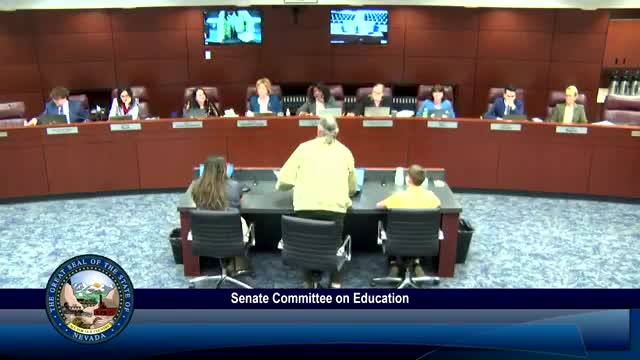Clark County youths advocate for enhanced STEM programs and support in schools
March 10, 2025 | 2025 Legislature NV, Nevada
This article was created by AI summarizing key points discussed. AI makes mistakes, so for full details and context, please refer to the video of the full meeting. Please report any errors so we can fix them. Report an error »

In a vibrant gathering at the Nevada State Legislature, young voices resonated with passion and purpose as they advocated for increased support for STEM (Science, Technology, Engineering, and Mathematics) education. The Senate Committee on Education meeting on March 10, 2025, showcased a diverse group of students, each sharing their unique journeys and the importance of STEM in shaping their futures.
Jack Latham, the former Clark County youth mayor, opened the session with a compelling argument for STEM education. He emphasized its role in equipping young minds to tackle pressing global issues like climate change and housing. "With better STEM thinkers, we can better tackle problems," he stated, urging lawmakers to prioritize STEM initiatives in schools.
Katie Zeller from the Nevada Institute for Children's Research and Policy introduced a group of students involved in after-school programs aimed at enhancing STEM opportunities. She highlighted the initiative's broader focus on advocacy, empowering students to become informed citizens and active participants in their communities.
The meeting continued with Araceli Valdez, who represented youth groups focused on substance abuse prevention. She spoke about the importance of training young leaders to advocate for health issues in their communities, showcasing the intersection of education and public health.
Freshman Melody Garcia Bishop and fellow student Zoe Rasmussen shared personal experiences that underscored the need for more extracurricular opportunities in STEM. Rasmussen, in particular, highlighted the lack of female representation in STEM fields and the challenges young women face in pursuing their interests.
Phoenix Tibbs, an aspiring aviator, passionately advocated for funding after-school STEM programs, sharing her own transformation from struggling academically to achieving straight A's and flying solo. Her story resonated with many, illustrating how access to STEM education can change lives.
Sianna Akaripa, a member of the inaugural Nevada moonshot flight crew, brought attention to the demographic gaps in STEM participation, particularly for Pacific Islanders. Her commitment to advocating for underrepresented communities highlighted the need for inclusivity in educational programs.
As the meeting concluded, the collective message from these young advocates was clear: investing in STEM education is not just about enhancing academic performance; it is about empowering the next generation to lead, innovate, and address the challenges of tomorrow. The committee's response to their passionate pleas could shape the future of STEM education in Nevada, making it a pivotal moment for both students and policymakers alike.
Jack Latham, the former Clark County youth mayor, opened the session with a compelling argument for STEM education. He emphasized its role in equipping young minds to tackle pressing global issues like climate change and housing. "With better STEM thinkers, we can better tackle problems," he stated, urging lawmakers to prioritize STEM initiatives in schools.
Katie Zeller from the Nevada Institute for Children's Research and Policy introduced a group of students involved in after-school programs aimed at enhancing STEM opportunities. She highlighted the initiative's broader focus on advocacy, empowering students to become informed citizens and active participants in their communities.
The meeting continued with Araceli Valdez, who represented youth groups focused on substance abuse prevention. She spoke about the importance of training young leaders to advocate for health issues in their communities, showcasing the intersection of education and public health.
Freshman Melody Garcia Bishop and fellow student Zoe Rasmussen shared personal experiences that underscored the need for more extracurricular opportunities in STEM. Rasmussen, in particular, highlighted the lack of female representation in STEM fields and the challenges young women face in pursuing their interests.
Phoenix Tibbs, an aspiring aviator, passionately advocated for funding after-school STEM programs, sharing her own transformation from struggling academically to achieving straight A's and flying solo. Her story resonated with many, illustrating how access to STEM education can change lives.
Sianna Akaripa, a member of the inaugural Nevada moonshot flight crew, brought attention to the demographic gaps in STEM participation, particularly for Pacific Islanders. Her commitment to advocating for underrepresented communities highlighted the need for inclusivity in educational programs.
As the meeting concluded, the collective message from these young advocates was clear: investing in STEM education is not just about enhancing academic performance; it is about empowering the next generation to lead, innovate, and address the challenges of tomorrow. The committee's response to their passionate pleas could shape the future of STEM education in Nevada, making it a pivotal moment for both students and policymakers alike.
View full meeting
This article is based on a recent meeting—watch the full video and explore the complete transcript for deeper insights into the discussion.
View full meeting